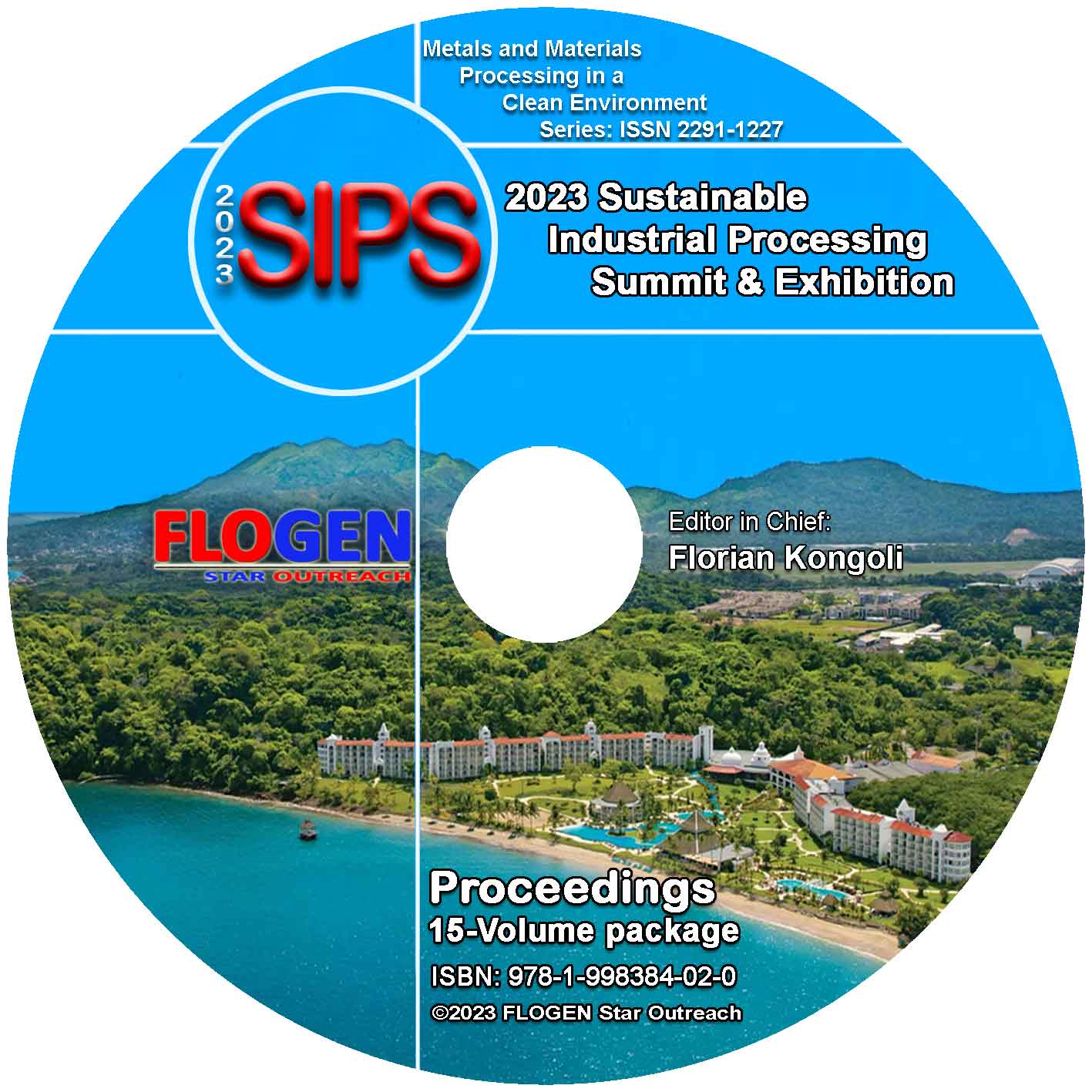2023-Sustainable Industrial Processing Summit
SIPS2023 Volume 14. Intl. Symp on Electrochemistry, Molten Salts, Corrosion and Recycling
| Editors: | F. Kongoli, R. Fehrmann, V. Papangelakis, I. Paspaliaris, G. Saevarsdottir, G. Kipouros, R. Singh, F. Wang, D. Macdonald, R. Gupta, M. Barinova, F. Ahmed, H. Ozgunay, K. Tang, N.N. Thanh, C. Gaidau, K. Kolomaznik |
| Publisher: | Flogen Star OUTREACH |
| Publication date: | 21 December 2023 |
| Pages: | 114 pages |
| ISBN: | 978-1-989820-98-8 (CD) |
| ISSN: | 2291-1227 (Metals and Materials Processing in a Clean Environment Series) |

CD shopping page
FOUNDRY WASTE OR SECONDARY RAW MATERIALS?
Alena Pribulova1; Peter Futas2; Patrik Fedorko3; Jozef Petrik4; Peter Blasko5; Marcela Pokusova6;1TECHNICAL U. IN KOSICE, Kosice, ; 2TECHNICAL U. OF KOSICE, Kosice, Slovakia; 3TECHNICAL UNIVERSITY, FACULTY OF MATERIALS, METALLURGY AND RECYCLING, Kosice, Slovakia; 4TECHNICAL UNIVERSITY OF KOSICE, Kosice, Slovakia (Slovak Republic); 5TECHNICAL UNIVERSITY OF KOSICE, Kosice, Slovakia; 6SLOVAK UNIVERSITY OF TECHNOLOGY IN BRATISLAVA, Bratislava, Slovenia;
Type of Paper: Regular
Id Paper: 131
Topic: 7
Abstract:
According to the Waste Act, a waste is something that the owner wants to get rid of, or the removal of which is necessary from the point of view of caring for a healthy environment. The term secondary raw material is not defined in the legislation, but it is commonly used in practice [1]. It is a raw material that is obtained from waste by various procedures, i.e. it is created by human activity, which distinguishes it from primary raw material that was created by natural processes without human intervention. The condition for treating treated waste to be called a secondary raw material is that there is a demand for it and that it is traded on the producer's side.
Foundry production is accompanied by the creation of a large amount of waste. At each stage of casting production, different types of waste are generated in different quantities. The largest amount of waste is used foundry sand, followed by various fine-grained wastes that arise during melting, preparation of moulding materials, production of moulds and cores, and during processing and blasting of castings [2]. Another important foundry waste is the slag that is created during melting in any furnace equipment.
The current situation in Europe is "pushing" the producers of these wastes to reduce their amount. One possibility is waste recycling [3,4]. Most foundry waste cannot be directly recycled, but with certain modifications, they become secondary raw materials that can be used primarily in construction, agriculture, and partially also in foundries.
This contribution analyses the waste generated in the foundry process and points out the possibilities of their treatment and further use.
Keywords:
Material; Recycling; Slags; Wastes;References:
[1] Bodikova, E.: Support of new technologies leading to the use of waste as secondary raw materials in the conditions of EU member states : Acta Metallurgica Slovaca, 12, pp.33 – 38, 2006[2] Pribulova, A., Gengel, P., Bartosova, M.: Waste from the production of steel and cast iron castings (dust - their characteristics, properties and possibilities of their further use), Faculty of Metallurgy, Technical University of Košice, 2010, ISBN: 978-80-553-0601-8
[3] European Commission: COM (2005) final. Communication from the Commission to the Council, the European Parliament, the European Economic and Social Committee and the Committee of the Regions. Promoting the sustainable use of resources: thematic strategy of waste prevention and recycling, Brussels, 21.12. 2005
[4] Council of Europe Regulation 96/61/WE Pollution Reduction and Limitation (IPPC), 1996